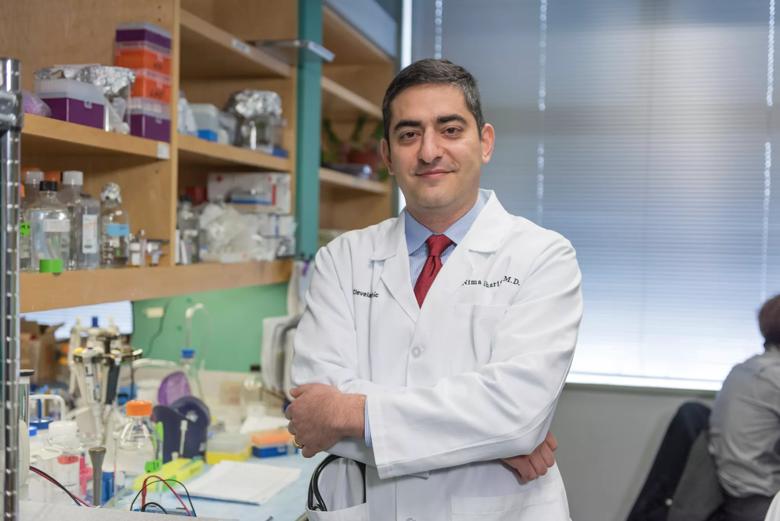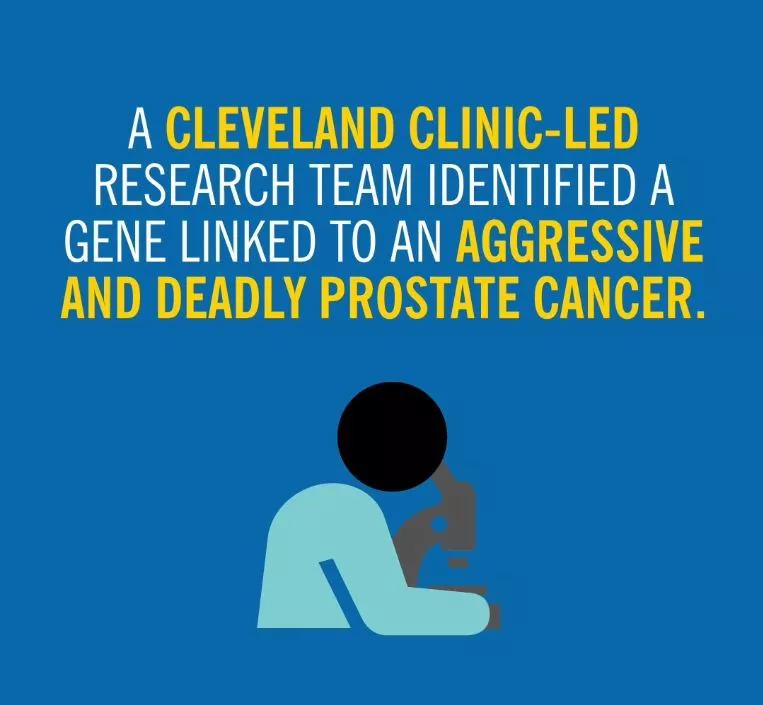Findings lay the foundation for more personalized treatments
images: 2
video: 1
audio: 0
text: 0
Content is property of Cleveland Clinic and for news media use only.

In a new Cleveland Clinic-led study published in JAMA Oncology, researchers show that a testosterone-related genetic variant – HSD3B1(1245C) – is associated with more aggressive disease and shorter survival in men with metastatic prostate cancer.
This study – the first clinical trial validation of the relationship between HSD3B1 status and clinical outcomes – suggests that genetic testing for HSD3B1(1245C) may help physicians identify patients most likely to benefit from additional and more aggressive treatment.
Nima Sharifi, M.D., of Cleveland Clinic’s Lerner Research Institute, and colleagues retrospectively analyzed data from 475 participants enrolled in a large, multi-center national clinical trial testing the efficacy of androgen deprivation therapy (ADT) alone or in combination with docetaxel in prostate cancer. They compared clinical outcomes between men who carried the variant versus those who did not.
The researchers found that HSD3B1(1245C) inheritance is associated with faster progression to treatment resistance and shorter overall survival in men with low-volume metastatic prostate cancer regardless of the use of docetaxel. Interestingly, the genetic variant led to shortened survival despite the administration of any other therapies following the development of treatment resistance.
“These findings lay the groundwork for more personalized and effective treatments for prostate cancer,” said Dr. Sharifi, senior author of the study. “If men carry this specific testosterone-related genetic abnormality we may be able to individualize their therapy.”
In addition, HSD3B1(1245C) was not found to influence clinical outcomes in men with high-volume prostate cancer. Dr. Sharifi notes this is not surprising as previous studies have shown that disease progression and burden is vastly different between high- and low-volume prostate cancer.

Taken together, these findings suggest that the presence or absence of this genetic variant can be used to help identify men with low-volume metastatic prostate cancer most at risk for quick progression to treatment resistance and earlier death – a discovery with significant implications for clinical care and genetic counseling.
A limitation of the study was a lack of diversity due to the patient population enrolled in the original clinical trial and genetic variant frequencies. Validating this association with a more diverse population will be an important next line of investigation.
In 2013, Dr. Sharifi made the discovery that the HSD3B1(1245C) variant helps prostate cancer cells evade ADT, the first line of defense against the disease. ADT works by cutting off cells’ supply of testicular androgens, hormones that fuel cancer cells to grow and spread. He showed that in men with the genetic change, cancer cells adapt to produce their own androgens, which leads to treatment-resistant prostate cancer. In 2017, he received the national Top Ten Clinical Achievement Award from the Clinical Research Forum for his discoveries linking HSD3B1(1245C) with poor prostate cancer outcomes.
“These findings represent a seven-year research story that started at the lab bench and has now reached the patient bedside,” said Dr. Sharifi. “As the team has shown here, incorporating genetic testing in prostate cancer as part of routine care has significant potential to improve treatment success and quality and length of life for men with prostate cancer who carry the HSD3B1(1245C) variant. This work is another step in that direction.”
Dr. Sharifi holds the Kendrick Family Chair for Prostate Cancer Research at Cleveland Clinic and directs the Cleveland Clinic Genitourinary Malignancies Research Center. He has joint appointments in the Glickman Urological & Kidney Institute and Taussig Cancer Institute.
Jason Hearn, M.D., Department of Radiation Oncology, University of Michigan, is first author on the study, which was supported in part by the National Cancer Institute, part of the National Institutes of Health, the U.S. Department of Defense and the Prostate Cancer Foundation.
Cleveland Clinic is a nonprofit multispecialty academic medical center that integrates clinical and hospital care with research and education. Located in Cleveland, Ohio, it was founded in 1921 by four renowned physicians with a vision of providing outstanding patient care based upon the principles of cooperation, compassion and innovation. Cleveland Clinic has pioneered many medical breakthroughs, including coronary artery bypass surgery and the first face transplant in the United States. Cleveland Clinic is consistently recognized in the U.S. and throughout the world for its expertise and care. Among Cleveland Clinic’s 81,000 employees worldwide are more than 5,743 salaried physicians and researchers, and 20,160 registered nurses and advanced practice providers, representing 140 medical specialties and subspecialties. Cleveland Clinic is a 6,690-bed health system that includes a 173-acre main campus near downtown Cleveland, 23 hospitals, 276 outpatient facilities, including locations in northeast Ohio; Florida; Las Vegas, Nevada; Toronto, Canada; Abu Dhabi, UAE; and London, England. In 2023, there were 13.7 million outpatient encounters, 323,000 hospital admissions and observations, and 301,000 surgeries and procedures throughout Cleveland Clinic’s health system. Patients came for treatment from every state and 132 countries. Visit us at clevelandclinic.org. Follow us at twitter.com/CleClinicNews. News and resources available at newsroom.clevelandclinic.org.
Editor’s Note: Cleveland Clinic News Service is available to provide broadcast-quality interviews and B-roll upon request.